Your Cart
90 day money-back guarantee
100% Free returns & exchanges
express payments available at checkout
How To Trim and Shape a Beard - In Depth Guide
Growing the perfect Viking beard takes time and dedication. Your beard should feel great and look healthy. You can take regular trips to your barber for beard shaping and trimming, or you can save money and time by doing it yourself.
In this article, we’ll take a deep dive and find out when and how to trim and shape your beard using a beard trimmer or scissors. It might seem a bit difficult at the beginning, but learning how to trim beard hair is a skill you can perfect with a bit of practice and the right tools. Read on to find out more.
Beard Trimming - Why and When You Should Do It
Beard hair can grow quite fast, with an average between 0.3 and 0.5 mm a day. And in a weird way, white hairs tend to grow almost twice as fast as pigmented ones. Because it takes such a long time to grow a full beard (somewhere between 2 and 4 months), cutting it might seem like blasphemy. But trust us when we tell you that it’s completely necessary, no matter your beard hair length.
Keep in mind that, by trimming and shaping your beard, you’re not taking off whole chunks. You’ll mostly be smoothing it out and cutting only a few millimeters at a time.
Your beard hairs have different stages of growth. Some of them are in the active phase of growth, and some of them are in the resting phase. As a result, some hairs will grow faster than others, and this might mess up your beard shape if you don’t take the time to trim it on a regular basis.
Another reason why you should make beard trimming one of your grooming habits is preventing or getting rid of split ends. Your beard hairs can dry out and develop split ends as a result of harsh weather conditions or improper beard care.
Contrary to what you might have heard in commercials, you can only prevent split ends by using products like beard oils and moisturizers. Once your beard hairs develop split ends, the only solution is to cut off the affected region.
You should trim your beard when needed. There is no universal answer, and it depends on your beard style, beard length, beard care routine, and your beard hair growth rate. In general, if your beard style is really polished and complex, you’ll probably need to trim it once every 5 or 7 days, or even more frequently if you prefer to keep it on the shorter side. For short beard styles, trimming is probably necessary once every 2 weeks, and for longer beards, you might go as long as 4 to 5 weeks without a trim.
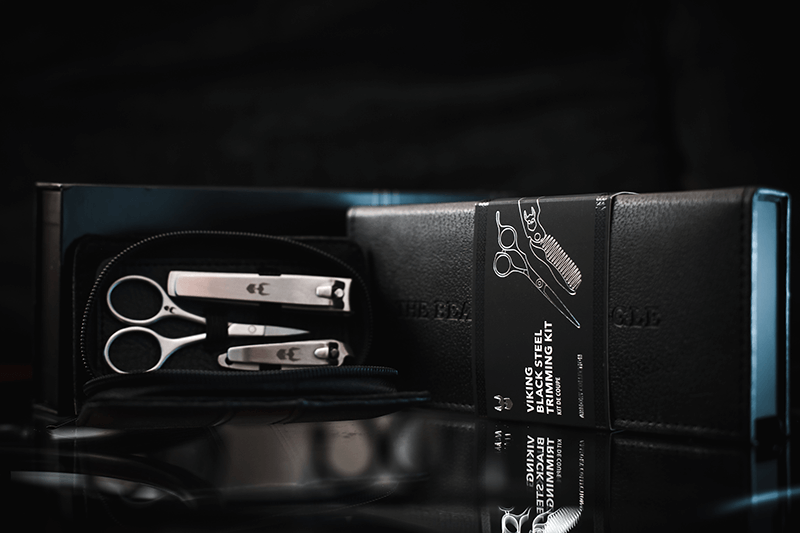
Beard Trimming Kit - Choosing The Right Tools
Men have been trimming their beards for over 8000 years, and humanity has gone from using flint, shark teeth, and clams to highly sophisticated tools that are specifically designed for beard hair maintenance. It’s needless to say that having the right tools in your trimming kit is super important.
A proper trimming kit should contain a few essentials items:
- Comb - you’ll use it to detangle and straighten your beard hairs. As a pro tip, it’s best to choose a comb that’s made from natural materials (such as wood), because it helps prevent damage to your skin and hair, as well as avoid static buildup.
- Trimmer - beard trimmers have different-sized guards and are designed for easy use and optimal handling.
- Scissors - these are indispensable tools for your beard upkeep, perfect for detail work and precision.
- Electric shaver or razor - do not be quick to dismiss these tools, because they are perfect for removing unwanted hairs from areas such as the cheeks and neck.
- Beard balm - you can use it after the trimming process to moisturize and protect your beard hairs.
- Moustache wax - you can use this type of product for styling and strengthening your moustache and beard.
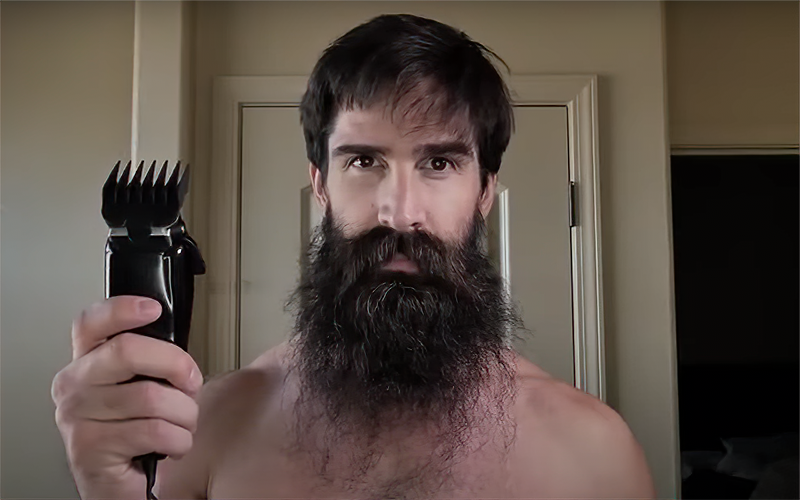
How To Use a Beard Trimmer
The first step is picking the right trimmer for your needs. Keep in mind that if you have a longer beard with thicker hair, you might need a more powerful trimmer. You can also choose between cordless and corded versions, as well as waterproof trimmers that you can use in the shower.
If you have a more complex beard style, you might want to pick a trimmer with different-sized guards and trimmer heads. You can use your trimmer without any guard for closer shaves in the areas above your beard line, and attach a guard when you’re trimming the longer hairs of your beard.
Although most trimmer blades are made from rust-proof metals, it’s still advisable to oil your trimmer blades regularly. Make sure to remove all the hairs before adding the oil, and to thoroughly clean the clippers before using your trimmer. You can apply the oil before or after using the trimmer, and this will help extend the product’s longevity.
Always begin by using the bigger guard, and switch to a lower-sized one if needed. You can use the trimmer without any guard to define your shape or clean up any strays. After finishing, remember to clean your trimmer and wash the guards.
How To Use Scissors to Trim a Beard
Scissors are the perfect precision tool when it comes to beard trimming. They are especially helpful for moustache trimming, and for cutting stray hairs. A pair of scissors can also be a lifesaver if you don’t have steady hands, because it’s easier to make notable mistakes with a trimmer than with scissors.
You can use scissors to perfect your look, round up the edges, or level the length of your beard hairs. Remember to start trimming from the bottom, then work your way up. As a pro tip, always check for symmetry. No matter what tool you’re using for trimming, make sure to have good lighting and a good view in your mirror.
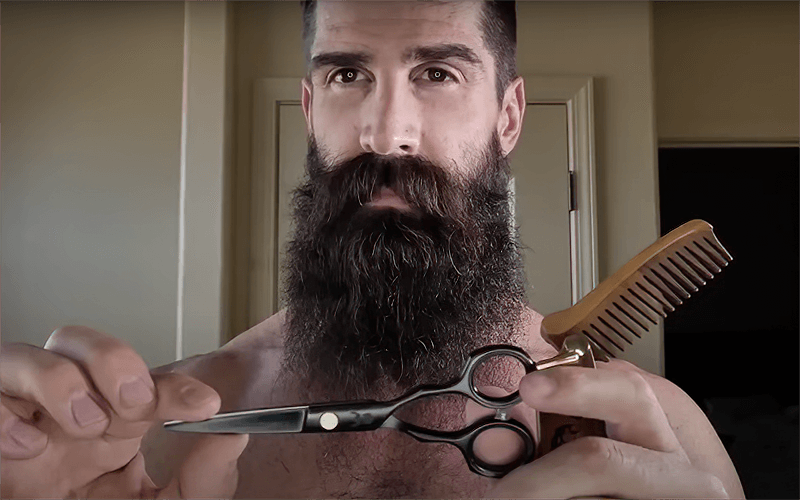
How To Trim your Beard - Step By Step In-Depth Guide For Beginners
Step 1 - Preparing your Beard
Before you jump in on the actual trimming, you’ll want to start with a clean beard. Use a dedicated beard shampoo then pat your beard dry with a towel. Never use vigorous scrubbing when you’re drying your beard because this might damage the hair fibers and put a strain on your hair follicles.
Step 2 - Detangle and brush your beard
Use your comb to gently detangle your beard hair. Brush your beard starting from the area underneath your chin in an upward motion, and the hair on your cheeks in a downward motion. This will help direct your beard hairs in their natural growth pattern.
You should use your comb or brush after your beard hairs are mostly dry. Tugging on wet hair is more likely to cause damage and break the hair fibers.
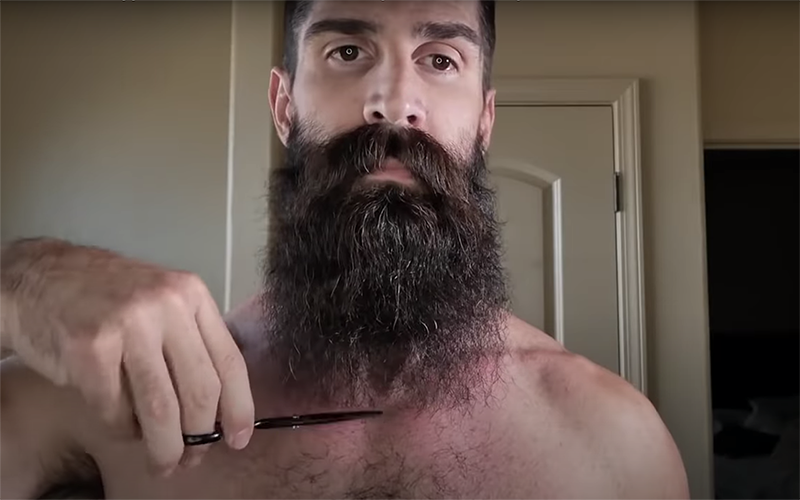
Step 3 - Trim off Excess Beard Hairs
Your beard hairs don’t have the same growing speed, so you’ll most likely have different lengths of hair throughout your beard. Choose a forward-facing position in the mirror and start by trimming off the excess beard hairs. You can use a trimmer, although using a pair of scissors offers more safety against hand slips.
Make sure to check the symmetry of your trimming and start from the base of your beard then head towards the cheeks. Start slowly with a few hairs at a time, and you’ll gradually get a sense of your overall beard shape.
Step 4 - Trim the Neckline
This is a really important step in the trimming process. Having a clean neckline can give you a more polished look. The problem with this step is the risk of trimming the neckline too high up. This can make your whole beard look unnatural, and give the appearance of a double chin.
The general rule is to use your Adam’s apple as a guide. You should position your body so you have a forward-facing position in the mirror. Tilt your head back to expose your neck area. You should start trimming just over the top of your Adam’s apple.
Use your scissors to create the lineup. Start from the center of your neck and head towards the sides in a very gentle “U” shape. Take your time and make sure your line is symmetrical. You can then continue removing the hair with your trimmer.
Now face your mirror with your head held straight and centered. If you’ve trimmed your neckline correctly, you shouldn’t be able to see any hair below your chin.
Step 5 - Trim The Side Beard
The jaw section of your beard is what usually attracts the eye. If your beard is not regularly trimmed, the sides of your beard will expand outward and make your face look wider than natural.
The most important part is knowing how to use your beard trimmer. If you prefer a short beard style, then start just under your chin with the blades facing away from you, and move the trimmer in an upward motion towards your cheeks. If you have a long beard, start at your cheek line and move towards your jawline in a downward motion. Remember to always start with the largest trimmer guard and switch to smaller sizes as needed.
If using a trimmer for this step doesn’t seem natural to you, you can also trim your side beard with your scissors. You’ll be less likely to make mistakes, but it will probably take a bit more time. Remember to occasionally use your comb to straighten your beard hairs and make sure you’re getting a symmetrical trim.
Step 5.1 - Trimming a goatee
Although it seems like a complicated process, it’s actually easier to trim a goatee than a full beard. You have to make sure you’re following the lines of your beard and you can define the edges by using your trimmer without a guard.
For the rest of your hair, you can use your trimmer with the appropriate seized guard. Start from the bottom of your beard with the blades facing away from you, then move the trimmer in an upward motion. You should always move against the direction of your hair growth.
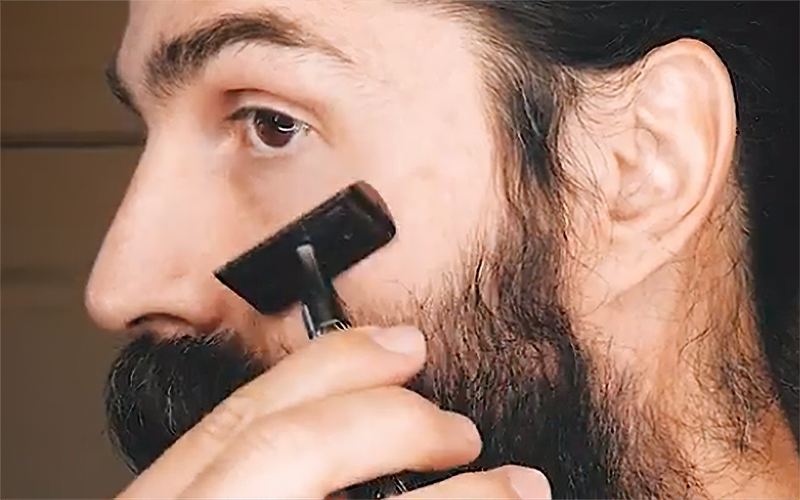
Step 6 - Trim the cheek line
This is usually easier to do, especially if you already have a pretty good idea about the shape of your beard. If you want to define your cheek line, simply draw an imaginary line that starts at the edge of your ear lobe and ends at the corner of your mouth.
Pro Tip: You can always cheat on this step and use a beard shaper.
You can trim the hair above the cheek line with your scissors or with your trimmer without a guard on. This step is important if you want to achieve a really defined beard style.
Step 7 - Trim the Moustache
Trimming a moustache is not an easy task. It definitely requires a steady hand, and it’s easier to make visible mistakes.
You need to comb the hairs and trim them at your lip line. You can do this with a trimmer without the guard on, but for beginners, using scissors for this operation is definitely the safer choice.
Step 8 - Using a Shaver
Although this step is optional, you can use a razor or electric shaver to clean off all the small hairs on your neckline and above your cheek line. This will leave your skin feeling silky smooth, and create a more defined look.
Step 9 - Shaping the Beard
Some final touches are necessary to refine the shape of your beard. You’ll need your scissors for this operation because they can offer you some much-needed precision.
You’ll need to comb your beard to rearrange your beard hairs, after which you can begin checking for symmetry, and adjust your edges around the jawline, cheekbone area, and moustache.
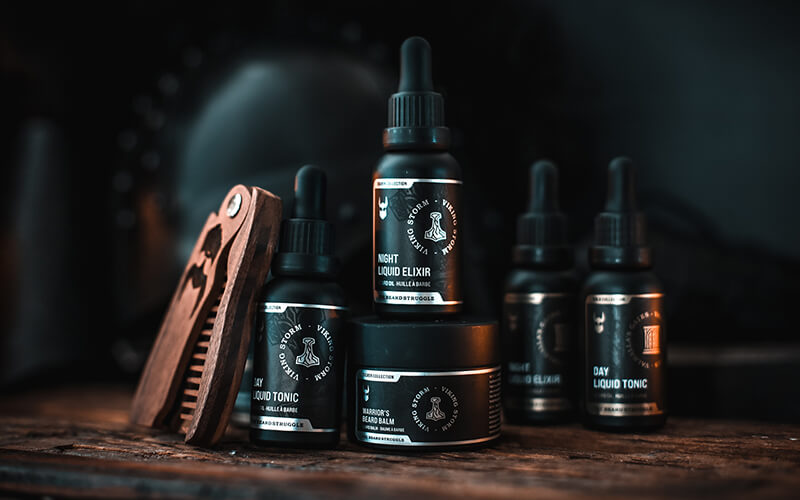
Step 10 - Post-Trimming Beard Care
Finish off your grooming ritual by applying your beard oil to keep your beard hydrated and looking healthy.
You can also use beard balm and beard wax for extra hydration and as a styling product. With your beard care ritual finished, you’ll definitely feel and look amazing.
Beard Trimming Ideas and Styles for 2021
All beards deserve a proper trim. Whether you’re rocking a goatee or a full beard, all beards deserve some love and care. Here are some beard trimming styles to get you started.
The stubble beard - generally represents 4 to 5 days of hair growth. This is a type of beard that’s probably never going to go out of style. It can be a clean look, with very well-defined lines on the cheeks and chin, or it can look a bit unkempt with a few stray hairs left for the dramatic effect. Some awesome examples of people who rock the stubble beard are Joe Manganiello, John Hamm, and Ryan Reynolds.
The short beard - it can be tapered, with faded sides, or it can be a uniform growth. One of the most popular styles of beards out there, it can be a perfect fit for any face shape. Some honorable mentions of the short beard brotherhood are Halfthor, Tom Stoltman, and Eddie Hall.
The long beard - these beautiful beards come in all shapes and sizes, and allow for a bit of creative exploration. A long beard can be wild-looking, perfectly polished, or even braided. Sky’s the limit with these types of beards. Some amazing people joining the long beard warrior band are Kevin Creekman, C.T. Fletcher, Pavel Ladziak, Jake The Viking, and Einar Selvik.
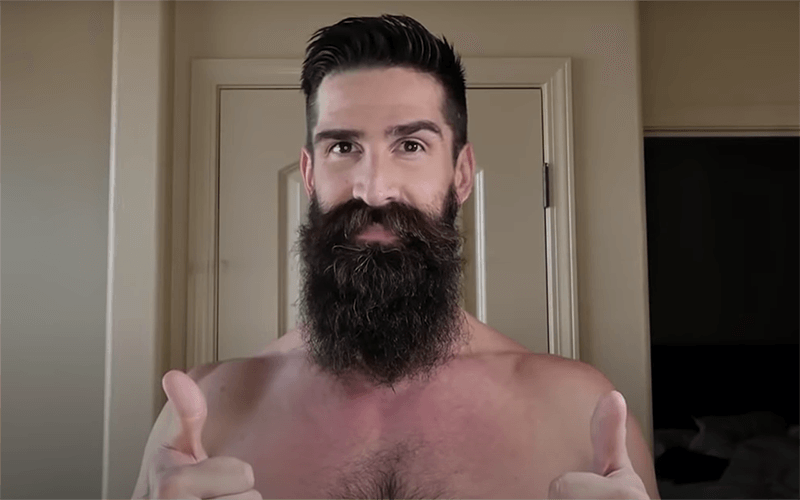
Conclusion
Beard trimming should be a part of your grooming habits. It will help maintain your beard shape, and most importantly it will keep your beard hair looking and feeling healthy. It’s a skill that you can learn with a bit of patience and practice, and the end result is always unbelievably satisfying.
You should trim your beard whenever necessary, whether it’s every other day or once every few weeks. You can use your trimmer, scissors, and any other tool you might have in your trimming kit. Trust your instincts and keep a steady hand, warrior.
Check out The Beard Struggle’s Shop And Find Out How To Trim And Shape Your Beard With The Confidence Of A Viking Warrior
